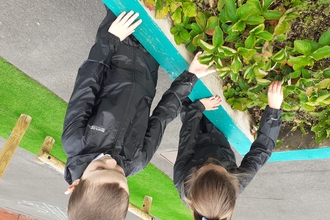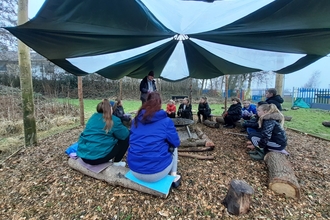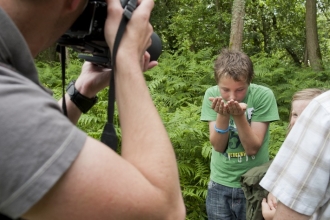
Jon Hawkins
The Nature Friendly Schools project is:
- Developing teachers’ confidence to embrace and deliver outdoor learning
- Helping to improve mental health and wellbeing in pupils
- Encouraging better engagement and resilience among pupils
- Nurturing pupils' care and concern for the environment
How does it work?
Nature Friendly Schools is a demonstration project, working to determine what model of school-led outdoor learning could work on a larger, national scale. To do this, we recruit schools to work in partnership with the project over a 12-month period. During this time the school will receive:
- Bespoke package of teacher training – designed to empower teachers to lead outdoor learning independently by raising their confidence, capacity, and knowledgebase
- Outdoor learning intervention based on an assessment of school needs which will be greening school grounds, with optional off-site visits or residential to new landscapes
- Package of curriculum and non-curriculum linked lesson plans, activities, and resources
- Package of clothing/kit/materials required to facilitate outdoor learning such as waterproofs, wellington boots and learning equipment
- Access to a unique online community
The majority of support takes place over the first six months of a schools’ journey, and gradually tapers off, empowering schools to take ownership of their outdoor learning. The activity in schools is independently evaluated to investigate whether the methodology applied within the project leads to sustainable, embedded outdoor learning across the whole school.
Through an innovative ‘team around the school approach’, the Nature Friendly Schools’ Resilience Through Nature Consortium; YoungMinds, Groundwork UK, Field Studies Council, Sensory Trust and six regional Wildlife Trusts, provides wrap-around support to schools, providing training and practical support for teaching staff that focuses on identifying and addressing barriers to outdoor learning.
What sets the project apart is its specialism in coaching and facilitation. Combining practical interventions in schools with tailored teacher training will ensure schools are equipped to take their nature friendly journey forwards once the project takes a step back.
What next?
Funding for the project is not guaranteed past March 2022.
Between September 2019 and March 2021, almost 16,000 children from 84 primary, secondary, special and API schools benefited from the project, despite the national Covid19 lockdown. Between April 2021 and March 2022, a further 30,000 pupils from 100 schools will benefit.
The project was initially planned to run over four years, benefitting more than 100,000 pupils but in spite of its proven success, the project will only be funded until March 2022.
Dr Amir Khan speaks about education recovery (https://vimeo.com/577498305)
Royal Society of Wildlife Trusts
Can my school join in?
All schools can increase the amount of time spent learning outdoors, not just those currently involved in Nature Friendly Schools. There are plenty of ways lessons can be taken outdoors and barriers can be overcome.
Maybe you can take the register outside in the playground each day, plant wildflower seeds in planters and watch them grow, or create an outdoor seating area in a corner of the school field using sections of tree trunks? Our Resources page contains lots of information to help schools progress their own outdoor learning journey.












